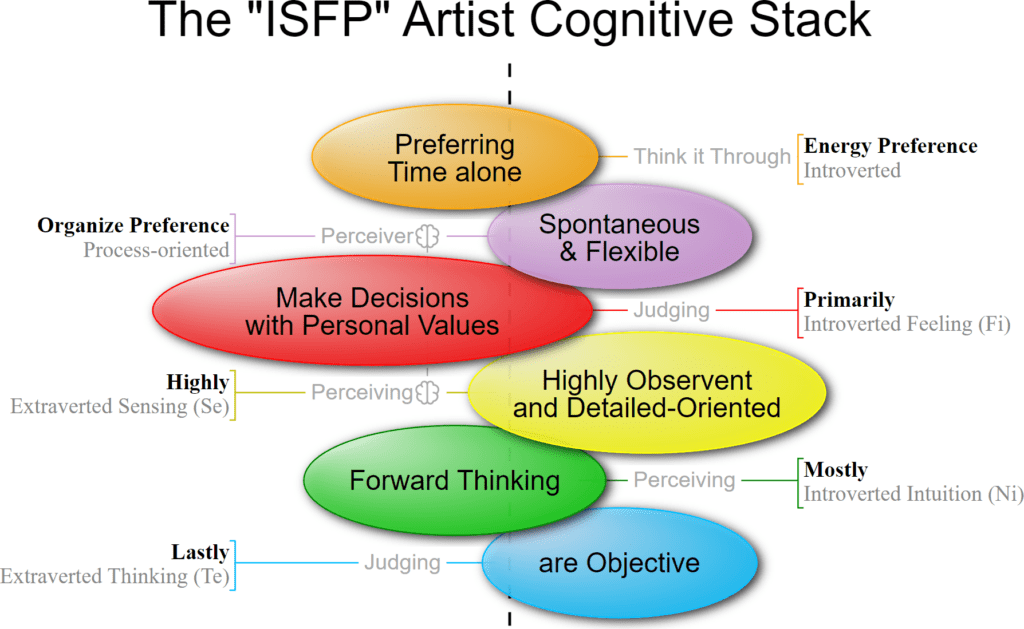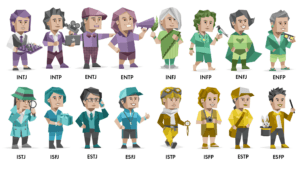What is the MBTI ISFP “Artist” Personality Type?

People with an ISFP Personality Type are frequently described as quiet, easygoing, and peaceful.
They are receptive and modest but take criticism personally.
Artists adapt quickly to change but don’t enjoy leadership roles.
With Introverted Feelings as their dominant function, Artists use personal feelings and subjective values when making decisions.
With Extraverted Sensing as their principal extraverted function, Artists are Perceivers who like gathering facts. They are highly observant and detail-oriented.

With their Introverted Intuition, Artists like exploring new ideas and will use Objective Reasoning from their Extraverted Thinking lowest function, but they don’t need much.
Artists are introverted, preferring time alone to think things through. They are process-oriented, spontaneous, and flexible.
Artists are “Concrete Perceivers” with Introverted Feelings and Extraverted Sensing. When feeling threatened, they will distract in a kinesthetic manner, with observable erratic physical gestures and posture changes and less reliance on ideas. They may also behave with the Distractor Satir Communication Style.
ISFP Personality Type cross-reference
- Keirsey Type – Composer
- Temperament Type – Sanguine
- Animal Type – Golden Retriever
- DISC Type – Steadiness
- Socio-Communicative Type – Amiable
- True Colors – Orange
- Color Code – Yellow
- Personality Compass – South
- Occupational Type – Conventional
- Learning Type – Reflector
- Leadership Type – Accommodator
Enneagram Types
The Enneagram is a Personality Typing System comprising nine different types.

Dominant Function – Introverted Feeling
- They care more about personal concerns than objective, logical information.
- People with this personality type deal with information and experiences based on how they feel about them.
- They have their own value system and create spontaneous judgments based on how things fit with their idea.
Auxiliary Function – Extraverted Sensing
- People with ISFP personalities are very in tune with the world around them.
- They are very much attuned to sensory information.
- They are keenly aware of even small changes in their immediate environment.
- Because of this, they often emphasize aesthetics and appreciate the fine arts.
- They are focused on the present moment, taking in new information and then taking action.
- They have a strong sense of their immediate surroundings, often noticing small details others might overlook.
- When remembering events from the past, they can recall strong visual imagery, and sights, smells, and sounds can evoke powerful memories associated with those senses.
Tertiary Function – Introverted Intuition
- This function runs in the background, feeding off the extraverted sensing function.
- They take in details about the world and often develop “gut feelings” about events and situations.
- While they generally do not like abstract concepts or ideas, this introverted intuition function may lead them to experience epiphanies about themselves and others.
Inferior Function – Extraverted Thinking
- One weakness ISFPs may have in organizing, although they may use this function more prominently in certain situations.
- This function is about looking for the most efficient way to do something.
- They might focus on being precise about the details and finding the most effective way to express an idea.
ISFP Traits
ISFPs are artistic, loyal, and harmonious. They are kind, friendly, sensitive, quiet, and easygoing. While soft and reserved, they are also known for being peaceful, caring, and considerate.
They dislike conflict and criticism because they seek harmony and are generally irritated when their personal space has been invaded.
A weakness of the ISFP is their tendency to be cynical, which does not translate well to others.
Their primary function is Introverted Feeling, which allows them to know what they value and make judgments based on these values.
Their auxiliary function is Extraverted Sensing, making them “earthy” people who love aesthetic beauty and like to focus on the details.
ISFPs tend to be ” doers ” rather than ” dreamers, ” and they spend more time thinking about the here and now rather than worrying about the future.
ISFPs dislike abstract theories unless they can see some practical application for them. They prefer learning situations that involve gaining hands-on experience. They like to live in the moment so that the big picture may be omitted from their goals.
They like to keep their options open, so they often delay making decisions to see if things might change or if new possibilities arise.
ISFPs learn best with a hands-on approach and may be bored with traditional methods that emphasize abstract thinking. Logic is secondary to ISFPs, and they are uncomfortable dealing with objective systems.
Strengths
- Very aware of their environment
- Practical
- Enjoys hands-on learning
- Loyal to values and beliefs
Weaknesses
- Dislikes abstract, theoretical information
- Reserved and quiet
- Strong need for personal space
- Dislikes arguments and conflict
ISFP Relationships
Friendships
- They are friendly and get along well with other people.
- Still, they typically need to get to know you well before they open up.
- You can be a good friend to an ISFP by supporting an acceptance of who they are.
- They can be light-hearted and fun.
- Still, they are also quite intense at times.
- Recognize that there will be times when your friend wants to share and when they want to retreat to a more personal space.
Personal Relationships
- They are introverted and tend to be reserved and quiet, especially around people they do not know well.
- They prefer spending time with a close group of family and friends.
- They are very private and keep their true feelings to themselves.
- Sometimes, they may avoid sharing their thoughts, feelings, and opinions with others, even their romantic partners.
- Because they prefer not to share their innermost feelings and try to avoid conflict, they often defer to the needs or demands of others.
- They have solid values but are not concerned with convincing others to share their point of view.
- They care deeply about others, particularly their closest friends and family.
- They are action-oriented and tend to show care and concern through action rather than discussing feelings or expressing sentiments.
Partner Relationships
- They are very considerate in relationships, often to the point that they continually defer to their partner.
- It would be best to try to understand your partner because they are usually not good at expressing their feelings and needs.
- When making decisions, ensure that your partner’s voice is heard and their feelings are given equal weight.
Parenting
- ISFP children tend to be perfectionists and can be their own harshest critics.
- Because they place such high expectations on themselves, they often underestimate or undervalue their skills and talents.
- If you are a parent to an ISFP child, you can help your child by encouraging them to be kind to themselves and recognize their value.
ISFP Careers
- People with ISFP personalities love animals and have a strong appreciation for nature.
- They may seek jobs or hobbies that connect them with the outdoors and animals.
- Because ISFPs prefer to focus on the present, they often do well in careers concerned with practical, real-world problems.
- Jobs that offer excellent personal freedom and autonomy are especially appealing to ISFPs.


